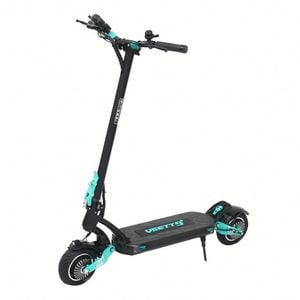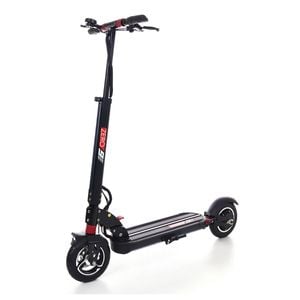Zero 9 Review
24 mph
Speed
25 miles
Range
40 lbs
Weight
While its lightweight frame and basic specs will endear it to newbies, its pneumatic tires, spring suspension, and compact folding frame mean it’ll also appeal to those looking for a comfortable commuter scooter. That said, the Zero 9 is operating in a crowded niche. So, in this review, we’ll explore how it compares to a wide range of similar scooters on the key metrics of speed, mileage, and ride quality, and put the 9’s extra features under the microscope. I’ll also be letting you in on one of the best-kept secrets in the electric scooter industry – so read on to find out if the Zero 9 is right for you.
$1,099.00
*Offers displayed are from retailers that we trust. If only one offer is available this is because they are the only retailer we recommend. To support our rigorous scooter review and editorial process, we rely on affiliate commissions. These are at no cost to you. Our work is independent and impartial. Read more here.
Zero 9 Review: 10 Things You Need to Know
Who is it Best For?
Will the Zero 9 Be a Good Fit For You?
With a speed of 24 mph and a weight of 40 lbs, the Zero 9 just about squeezes into the upper limits of what I consider a commuter scooter. Offering a little more oomph than other commuter rides such as the Unagi Model One E250 (17 mph), the Segway Ninebot Max (19 mph), and the Turboant X7 Pro (20 mph), the Zero 9 will suit you if you’re looking for a zippy ride to get from A to B.
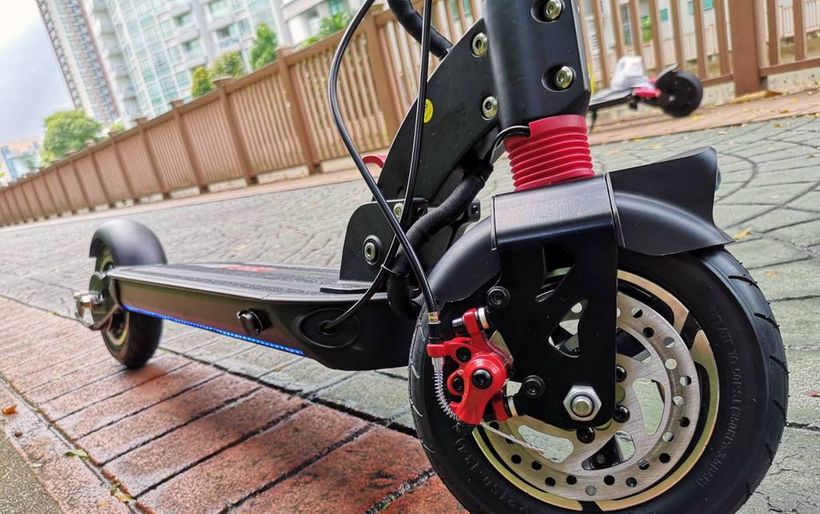
The Zero 9’s natural habitat is the well-paved concrete and asphalt surfaces of the city. It is unlikely to satisfy the speed needs and adrenaline cravings of more advanced riders, or those looking for a strong acceleration rate and well-equipped hill-climbing capabilities.
The biggest thing the Zero 9 has going for it is its portability. It has an adjustable, telescopic stem, as well as a folding frame and handlebars. This combination will suit you if you need to constantly fold, carry, and store your scooter.
Pros and Cons
- Dual suspension that is primed for city rides
- Light and compact
- Sports a telescopic stem for adjustable handlebar height
- Good build quality
- Foldable handlebars offer portability in spades
- Mood LED deck lighting adds a touch of class
- Not good value for money when compared to similarly-priced scooters
- No water resistance rating
- Headlight is positioned too low and isn’t strong enough for riding at night
Value for Money
Is the Price Tag Worth it?
Make no mistake, the Zero 9 is a popular scooter. But is it worth the price tag?
Before I explain, I want to let you in on a little secret. It’s one that you may already be familiar with – particularly if you’ve read my other scooter reviews and noticed that I haven’t talked all that much about the Zero 9 across the site.
Because the secret is this – the Zero 9 has a long-lost twin.
Separated at birth, the Zero 9 is – at least when it comes to frame and materials – pretty much the same scooter as the Apollo City.
Yep – both models are made by scooter manufacturers Titan/Unicool, and, as a result, the 9 and the City sport the same frame. Zero and Apollo then take these frames, kit them out with their battery of choice, and use colors and logos to brand them with the look and feel of their respective product lines.
This little-known (but important) fact is one of the reasons I haven’t featured the Zero 9 across my site so far – simply because I haven’t, in good faith, been able to recommend the Zero 9 over the Apollo City. Here are the key differences between the two doppelgangers.
| Specs | Zero 9 | Apollo City |
|---|---|---|
| Motor | 48V 600W | 48V 600W |
| Top Speed | 24 mph | 25 mph |
| Battery | 48V 13.2Ah LG | 48V 13.2Ah Dynavolt |
| Range | 25 Miles | 28 Miles |
| Load | 220 lbs | 265 lbs |
| Weight | 40 lbs | 39 lbs |
| Brakes | Front Disc/Rear Drum | Front Disc/Rear Drum |
| Tires | 8.5 Inch (Air-Filled) | 8.5 Inch (Air-Filled) |
| Water-Resistance Rating | None | IP54 |
| Design | Red, White & Black | Blue, White & Black |
| Price | $1,099 | $999 |
As you can see, the Apollo City tops the Zero 9 when it comes to its range and load-bearing capabilities. The City is also slightly lighter, cheaper, and sports a water resistance rating. One major point of contention is the power and longevity of these scooters’ respective batteries.
The City is powered by Dynavolt cells, which are amongst the most cutting edge on the market. However, the Zero 9’s LG cells do tend to slightly outperform their Dynavolt counterparts over time, so – despite not being able to go as far as the Apollo City on a single charge – the Zero 9 may have the edge when it comes to the endurance capabilities of its battery’s lifespan. For context, both battery types match each other for performance up until around the 5-year point, and the only time at which there is a prominent change in performance is after 9 years.
The point I’m trying to make here is that when it comes to value for money, the Zero 9 isn’t necessarily the best option. If you like the 9’s specs, you’re better off opting for the Apollo City, for all the reasons outlined above. Sure, the Zero 9 may take the crown when it comes to battery performance over years of use but in my experience riding scooters, you’ll likely upgrade your scooter for a more advanced model down the line – just like you upgrade your phone every few years. Plus, by opting for the Apollo City you’ll save some money too.
As we’ll also see in our performance comparisons later in the review, there are plenty of better similarly-priced models than the Zero 9. If speed and acceleration are your top priorities, you’re better off shelling out for the VSETT 9+ (15.6Ah). If mileage is, on the other hand, your key focus, you’ll be better served with the VSETT 8R.
Alternatives
What Other Scooters Should You Consider?
VSETT 9+ (15.6Ah)
- Speed: 33 mph
- Range: 28 miles
- Weight: 55 lbs
- Load: 265 lbs
Why is it Better Than the Zero 9?
- Faster (+9 mph)
- Sports dual motors and a 36% faster acceleration rate
- Far better at climbing hills
- Longer range (+ 3 miles)
- Supports more rider weight (+45 lbs)
- Has a water resistance rating (IP54)
- Adjustable suspension
- Swingarm suspension delivers a more comfortable ride
Why is it Worse Than the Zero 9?
- Costs more (+$125)
- Heavier (+15 lbs)
- No telescopic stem
Price:
- 1,224.00
Apollo City
- Speed: 25 mph
- Range: 28 miles
- Weight: 39 lbs
- Load: 265 lbs
Why is it Better Than the Zero 9?
- Cheaper (Save $100)
- Longer range (+3 miles)
- Supports more rider weight (+45 lbs)
- Has a water resistance rating (IP54)
Why is it Worse Than the Zero 9?
- None
Price:
- 999.00
VSETT 8R
- Speed: 26 mph
- Range: 42 miles
- Weight: 46 lbs
- Load: 265 lbs
Why is it Better Than the Zero 9?
- Far superior range (+ 17 miles)
- Supports more rider weight
- Faster (+ 2 mph)
- Swingarm suspension delivers a more comfortable ride
- Adjustable suspension
- Comes equipped with an IP54 water-resistance rating
Why is it Worse Than the Zero 9?
- Costs more (+$200)
- Heavier (+6 lbs)
- No headlight
Price:
- 1,299.00
Design
Handlebars
First up, let’s get to grips with the Zero 9’s foldable handlebars. I’ll discuss their folding functionality a little further down the page (in the ‘Folding & Portability’ section), so all you need to know right now is that the sliding screw-type mechanism used is simple, intuitive, and solid.
Aside from folding, the handlebar height is completely adjustable thanks to the telescopic stem. You can position the handlebar height anywhere between 29 and 39 inches from the deck, and easily adjust it via the quick-release locking lever.
Of course, this cool feature does mean that the Zero 9 runs the risk of stem wobble, as can be the case when a lot of folding or adjustable parts are involved. Indeed, some of my fellow scooter reviewers have highlighted that the handlebars require tightening after every few rides.
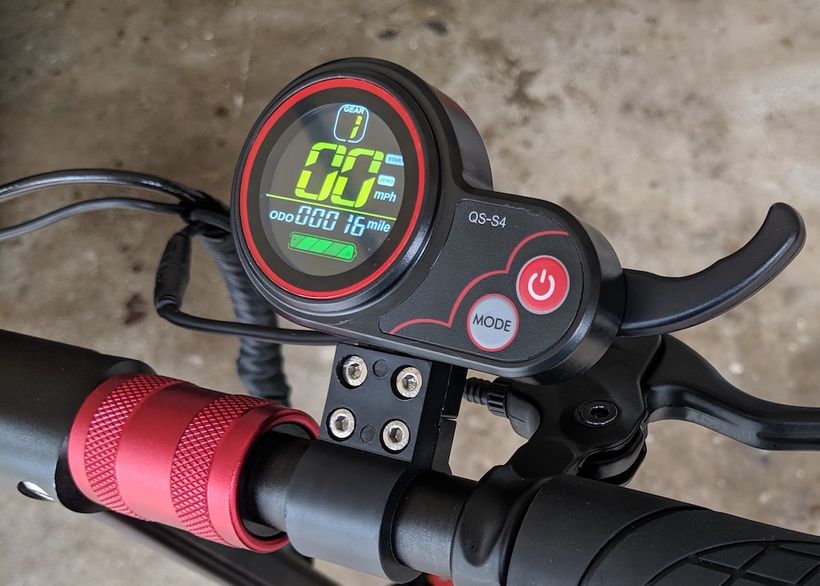
Elsewhere, the handlebars play host to a pair of hand-operated mechanical brake levers, as well as its QS-S4 display. This device is something I’ll unpack a little later on, and its main purpose is to serve the dual functions of both a finger throttle (for controlling your scooter’s speed and acceleration) and a display screen.
The QS-S4 is where you’ll view your scooter’s speed, battery life, and riding mode, as well as the distance you’ve traveled both on your current trip, and all-time (odometer). There’s even a hidden USB port, which (while I wouldn’t recommend it) can be used to charge your electronic devices.
To finish off the handlebars, the ergonomically shaped grips are coated in a robust and grippy rubber. These easily top the cheaper, uniformly-shaped, grips that we see other scooters like the Kugoo G2 Pro.
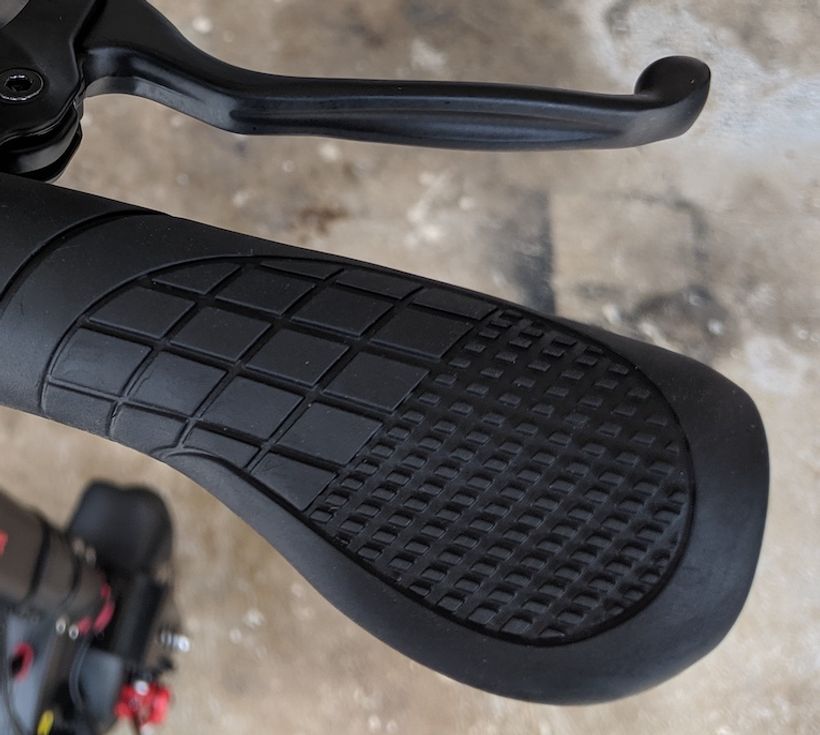
Frame
The Zero 9 may have its drawbacks, but style isn’t one of them. It turns heads with a bold two-tone black and red color palette. The frame is finished to a good standard, while the exposed, bunched cabling protruding from the top and bottom of the steering column helps keep the aesthetic clean.
Oh, and I love the Zero 9’s lighting setup. With strips of vibrant LED lighting embedded into both sides of the deck and the front of the stem, it illuminates the street vertically and horizontally.
Ultimately, there’s nothing not to like about the look and feel of the frame. The red accents are subtle enough to avoid being overbearing, while the Zero branding – despite taking a prominent place on the stem – isn’t as loud as I’ve seen on other scooters. It’s even kind of thrilling how much the red of the Zero 9 contrasts dramatically with the blue branding of its twin, the Apollo City – furthering the narrative of rivalry between these two (almost identical) models.
Deck
Something I appreciate about the Zero 9 is the ample standing room that the deck affords. Measuring up at 19.5 inches long and 7.7 inches wide, it is shaped like a skateboard – I just wish it was as grippy as one.
The deck is sparsely coated in a trio of grip tape columns, which, while they may look cool, don’t offer as much traction as decks that are fully coated in a grippy surface. As a general rule, I prefer my decks to be covered entirely in rubber – it makes them easier to wipe down and provides a uniform grip no matter the placement of your feet.
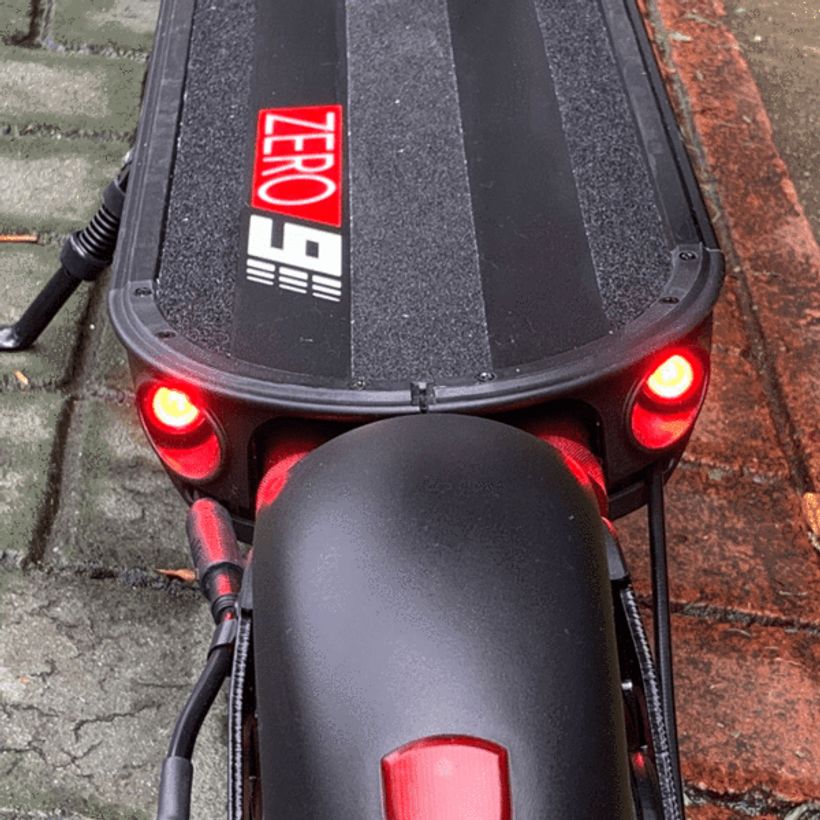
Another downside of the deck is that it lacks a kickplate at the rear. Kickplates are small platforms that you can place your back foot on, allowing you to lean into your ride and strike a more aggressive, aerodynamic posture when hitting high speeds. The Zero 9 just has a rear fender, but this is built to protect you from mud splashes, and not as a footrest. If a kickplate is as important to you as it is to me, the VSETT 9+ and 8R are great alternatives to the Zero 9.
Despite all this, though, the kickplate isn’t a must-have for a scooter like the Zero 9 which is primed for commuting.
One highlight of the deck is that it offers 4 inches of ground clearance, meaning you can feel comfortable while riding without running the risk of bottoming out.
Wheels
Big, air-filled tires are king – so it’s a breath of fresh air that the Zero 9 has them. At 8.5 inches, the tires are big enough to afford you a generous contact patch with the road, which helps when it comes to traction and handling.
Sure, you’ll have to be wary of punctures – but this is the only reason you’d ever choose to avoid pneumatic tires. They’re superior to their solid counterparts in pretty much every way, but most notably in the added suspension and shock absorptive qualities they offer. This layer of insulation helps safeguard your limbs from the effects of bumps, jolts, and uneven riding surfaces.
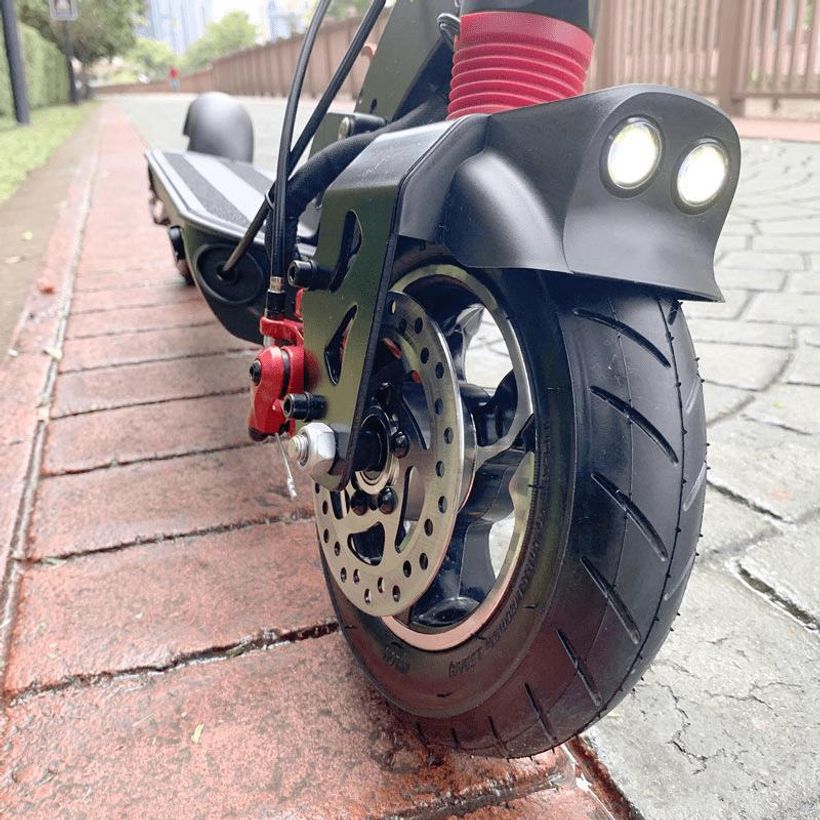
Overall, the size profile and tread of tires make them ideal for navigating city streets. They strike the perfect balance between being nimble and comfortable.
Build Quality & Durability
Build quality is always a key factor, but it’s particularly important for electric scooters that go faster than 20 mph. After all, you don’t want your scooter’s frame falling apart on you – particularly when traveling at speed.
It’s good news, then, that the Zero 9’s sturdy design – which encompasses good quality tires, a top-of-the-line LG battery, and a durable frame – is perfectly equipped to deliver ride comfort and reliability, even at the upper limits of its 24 mph speed capabilities. There’s no annoying rattling, and the single motor is as quiet as a mouse.
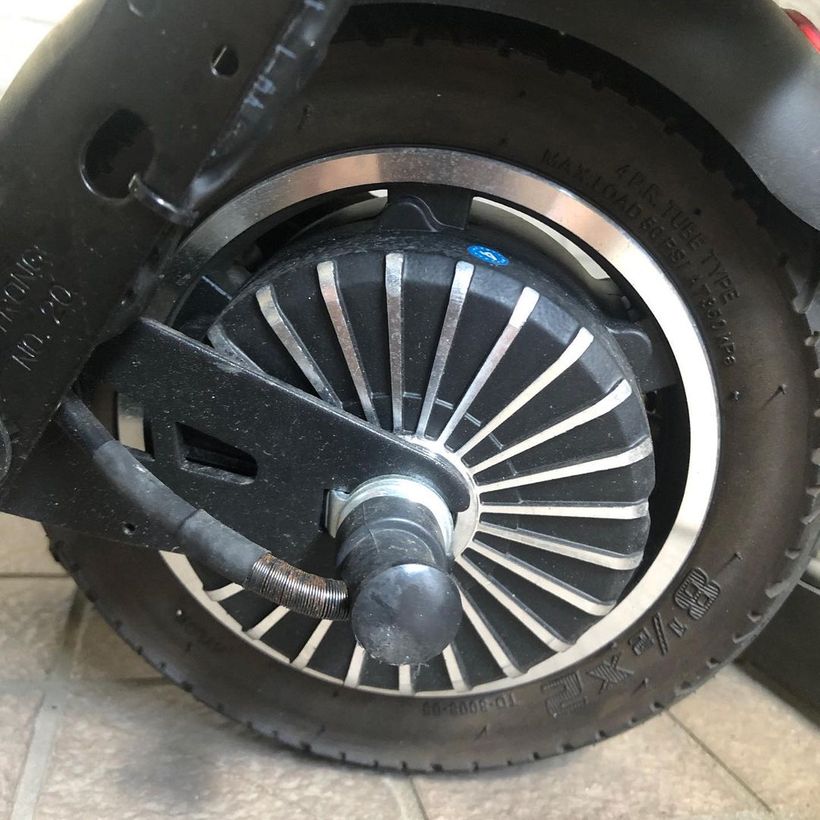
Refreshingly, the designers have also placed an emphasis on portability. Not only do the scooter’s handlebars and stem fold, but its stem can be compressed by a whole 10 inches from its full height, helping you to pack it down when preparing it for storage or transportation.
The only real letdown here is the scooter’s lack of a water-resistance rating. Many of the Zero 9’s top competitors – which include the VSETT 8R and 9+ models, as well as the Apollo City – all have water resistance certifications. While I wouldn’t recommend riding any of these scooters in heavy rain, an IP rating does give you that extra peace of mind – which you certainly don’t get with the Zero 9.
Weight & Load
The Zero 9 weighs 40 lbs, which is about what I’d expect given the specs and power on offer. Plus, at under 42 lbs – my maximum recommended weight for commuters – the 9 qualifies as an ideal selection for last-mile commutes. In fact, its weight is comparable to the majority of other popular commuter scooters, including:
- EMOVE Touring (39 lbs)
- EVOLV Tour 2.0 (39 lbs)
- Apollo City (39 lbs)
- EVOLV City (39 lbs)
- Horizon 10.4 (40 lbs)
In terms of load, it can support up to 220 lbs of rider weight. This is fairly standard for entry-level scooters and a few premium modes like the INOKIM Light 2 (which I regard as the most portable scooter), but it falls short of similar scooters.
When we compare the load capacity with its closest competitors – namely, the Apollo City and VSETT 8R, both support rider weights of up to 265 lbs, making the Zero look a little insufficient. Jump back to the ‘Alternatives’ section to recap the key differences between the models.
If you’re looking for a scooter with excellent load-bearing capabilities, the Zero 9 isn’t it, and you can certainly get more for your money elsewhere. Check out my guide to the best electric scooters for heavy adults to learn which of the top load-bearing models on the market is right for you.
Folding & Portability
As I touched on earlier, the relatively trim 40 lbs weight makes it a tantalizing proposition for commuters. But what makes it even more ideal for traveling riders is its folding functionality, with the Zero 9 folding both in half, as well as sporting collapsible handlebars.
And, as far as folding mechanisms go, this one’s a doozy. Simply press down the folding lever at the base of the Zero 9’s stem to unlock the scooter’s steering column. From here, simply fold the column up (this works via a pair of deck-mounted hinges), until it locks in place in an upright position.
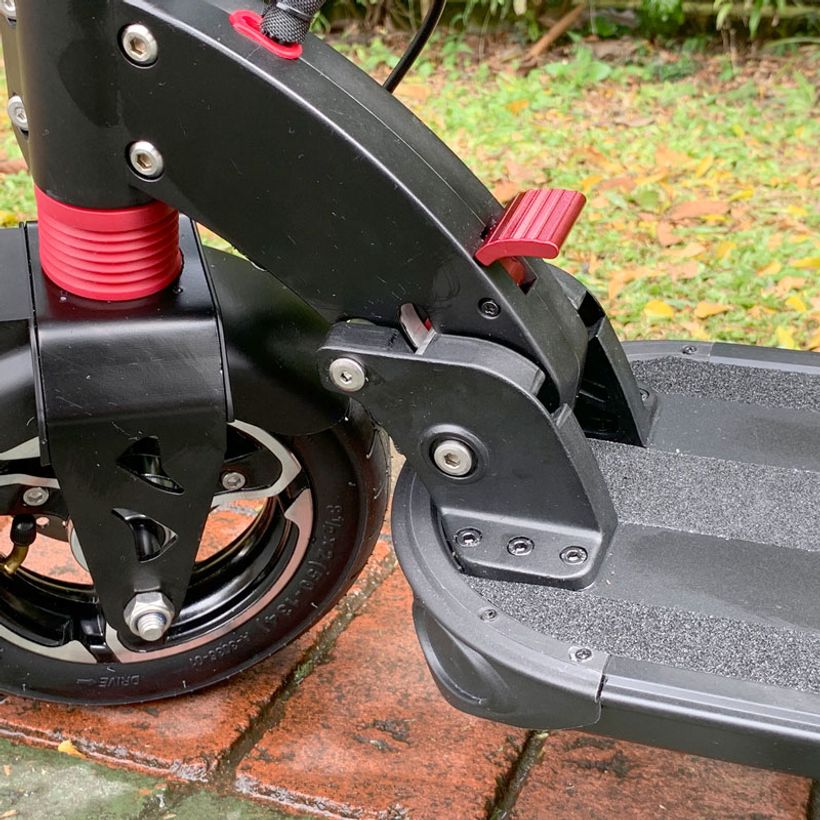
The Zero 9’s handlebars also fold, via a similarly intuitive method. Simply twist the locking sleeves and then slide them outward to release the grips and fold them inward.
Often, foldable handlebars can fall short of the mark as a result of ineffective locking mechanisms. For example, the EMOVE Cruiser uses spring-loaded tension cuffs instead of locking sleeves that screw into place. This means that the cuffs simply plug over the top of the main handlebar frame and aren’t tightened into place. While this method still keeps the handgrips locked into place (i.e. they don’t collapse inwards while in use), you do tend to experience a little wiggle room which can be unnerving at times. However, this is not an issue with the Zero 9 thanks to its combined tension and screw mechanism. The only thing you have to do is tighten the sleeves every so often since the natural vibrations from riding loosen them over time.
Overall, the foldable handlebars serve to make the Zero 9 portable, meaning you’ll have no issues slotting it into your trunk, or out of sight at your home.
Plus, with a fully adjustable telescopic stem (which I’ll unpack in greater detail in the ‘Extra Features’ section below), the Zero 9 can shrink to an even more compact size.
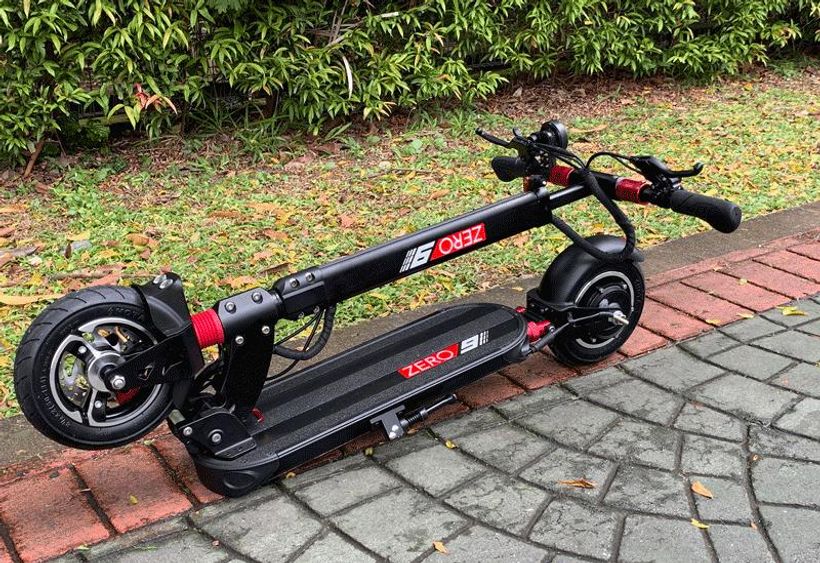
A Guide to Foldable Electric Scooters (Lightest & Most Compact)
Assembly
The Zero 9 arrives fully assembled, though you should take some time to ensure that the various nuts and bolts are sufficiently tight, which you can do with a basic Allen wrench.
Once your Zero 9 is ready for action, you’ll want to make sure that there’s sufficient pressure in the tires, and that it's charged in full before you hit the road. It’s also worth spending time getting to grips with the scooter’s QS-S4 display, particularly the range of P-settings that’ll allow you to plumb the deepest depths of the Zero 9’s customizability.
Ride Quality
Is the Zero 9 Comfortable to Ride?
While the Zero 9’s suspension in and of itself doesn’t exactly reinvent the wheel, the scooter still provides a dependable ride when it comes to comfort.
That, of course, is in no small part down to its wheels. A pair of decently sized pneumatic tires assist the front and rear suspension, by gobbling up a lot of the jarring impact caused by urban terrain. The scooter’s deck also provides ample clearance, which will help when it comes to propelling yourself (safely) off curbs.
Ultimately, the Zero 9 delivers a good level of ride quality if you stick to well-maintained roads and sidewalks. While it can cope with rougher urban terrain (i.e. pothole-ridden roads), it doesn’t have the pedigree to absorb the shocks from big impacts meaning your knees and wrists take the brunt.
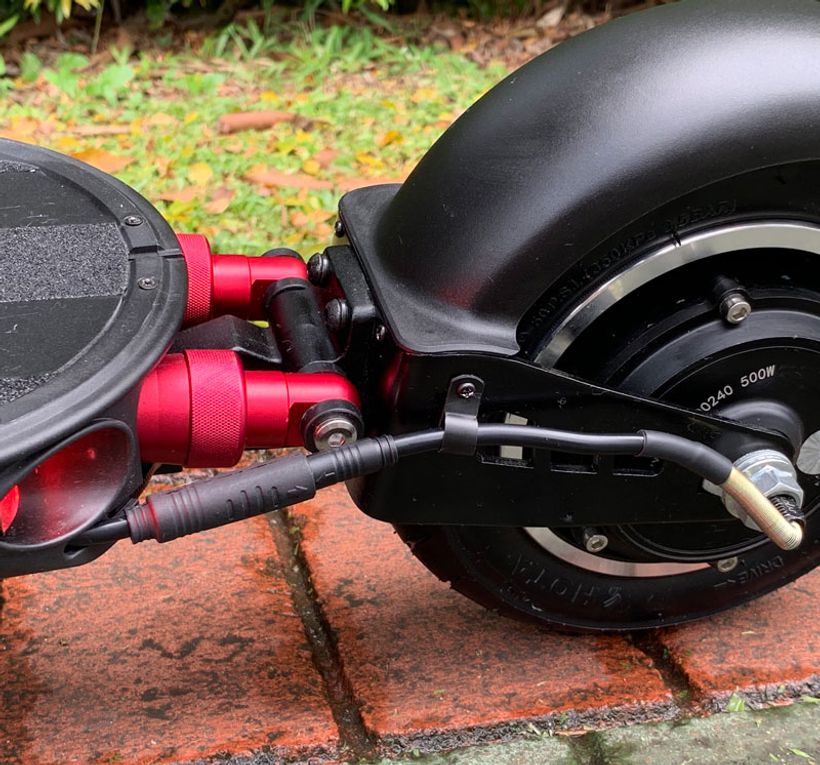
How does this compare to the scooters that I recommend as alternatives?
Well, the same can be said for the Apollo City since it shares the same tire and suspension setup as the Zero 9. The stand-out scooter for ride quality that delivers above and beyond the Zero 9 is the VSETT 9+ (15.6Ah). This scooter utilizes a superior adjustable spring and swingarm suspension system that has better compression and damping. The larger, vertically aligned springs are better equipped to absorb impacts, while the swingarms ensure smooth transitions from the springs compressing and rebounding. The swingarms are the key part of the suspension system that deliver superlative levels of comfort. Plus, because of VSETT 9+ ‘s superior design, it can handle light off-road terrain.
Similar to the VSETT 9+ (15.6Ah), the VSETT 8R boasts a spring and swingarm suspension system that puts it head and shoulders above the Zero 9 when it comes to ride comfort. After all, the 8R was originally intended to be the Pro line of the Zero 8 and 9, before it was rebranded to VSETT.
Performance & Safety
Speed & Acceleration
The Zero 9 is capable of top speeds of up to 24 mph. But is that good value for money? Let’s take a look at how the 9’s maximum velocity lines up against other scooters in its price range to find out.
Speed vs Price Comparison
Taking the 20 most comparable scooters to the Zero 9’s $1,099 price point – that is, a $500 range with the 9 in the middle – it emerges at the mid to lower end of the pack, tied with the Apollo City, the UScooters Booster GT, and the WideWheel Dual. The WideWheel has the benefit of being the only one of this gang to boast dual motors, meaning it has an acceleration rate that’s almost a full third (31%) faster than the Zero 9’s.
Now we’re on the topic of dual motors, let’s talk about the fastest scooter in the Zero 9’s price range – the esteemed VSETT 9+ (15.6Ah). The 9+’s pair of 650W motors don’t just offer it a sumptuous 33 mph of speed – they also empower it with the most blistering acceleration rate of all similarly-priced modes to the Zero 9.
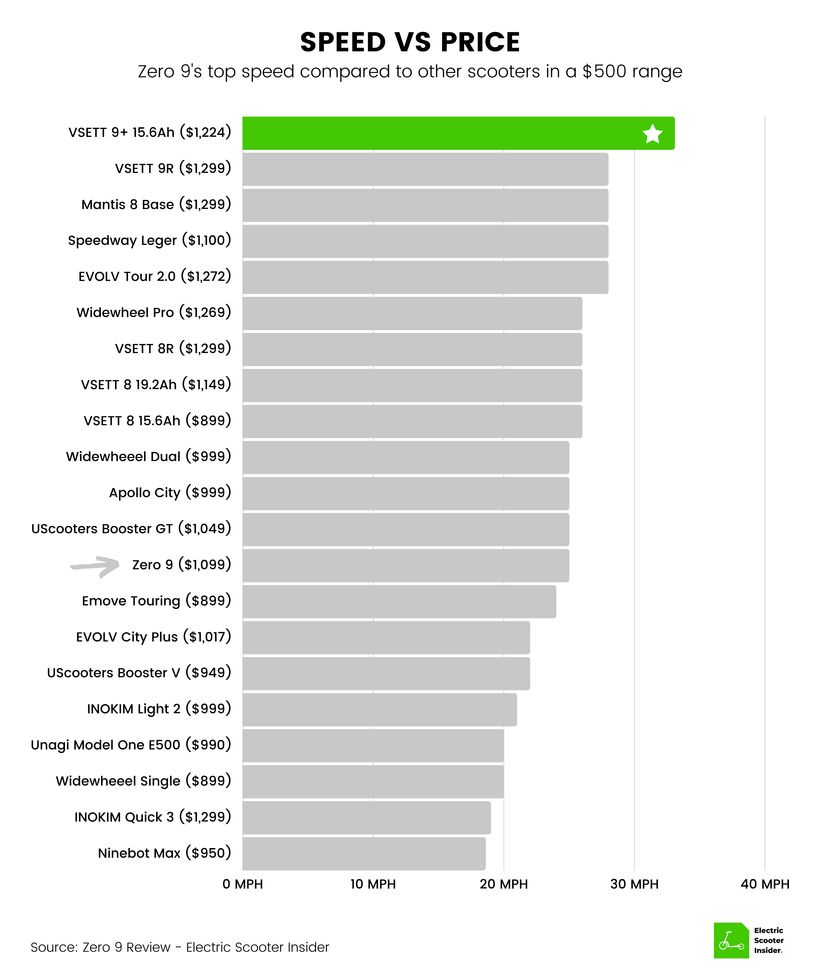
For reference, the VSETT 9+ can hit 15 mph in just 2.7 seconds – a whole 36% faster than the Zero 9’s 4.2 seconds.
And it’s not just on the metrics of speed and acceleration that the VSETT 9+ beats the Zero 9. The former also benefits from a superior suspension system, with its swingarm/spring combination allowing for more shock absorption than standalone springs. This, ultimately, delivers better ride quality across the board.
While the VSETT 9+ undoubtedly offers the zippiest pace in the Zero 9’s pricing bracket, it’s also worth mentioning the runners-up. The VSETT 9R, Mantis 8 Base, EVOLV Tour 2.0, and Speedway Leger all offer top speeds of 28 mph.
Speed vs Weight Comparison
Now, let’s assess the Zero 9 against its closest rivals on the metric of weight. Applying a 5 lbs weight range on either side of the 9’s 40 lbs – which gives us a bracket of 35 to 45 lbs – turns up another 22 models in this category. So where does the Zero 9 sit?
Unlike its underwhelming performance in our speed vs price analysis, the Zero 9 recovers for a strong showing here, placing an impressive joint third. This shows that the Zero 9 does a fine job where many other scooters have failed – finding that precious equilibrium between speed and a lightweight frame.
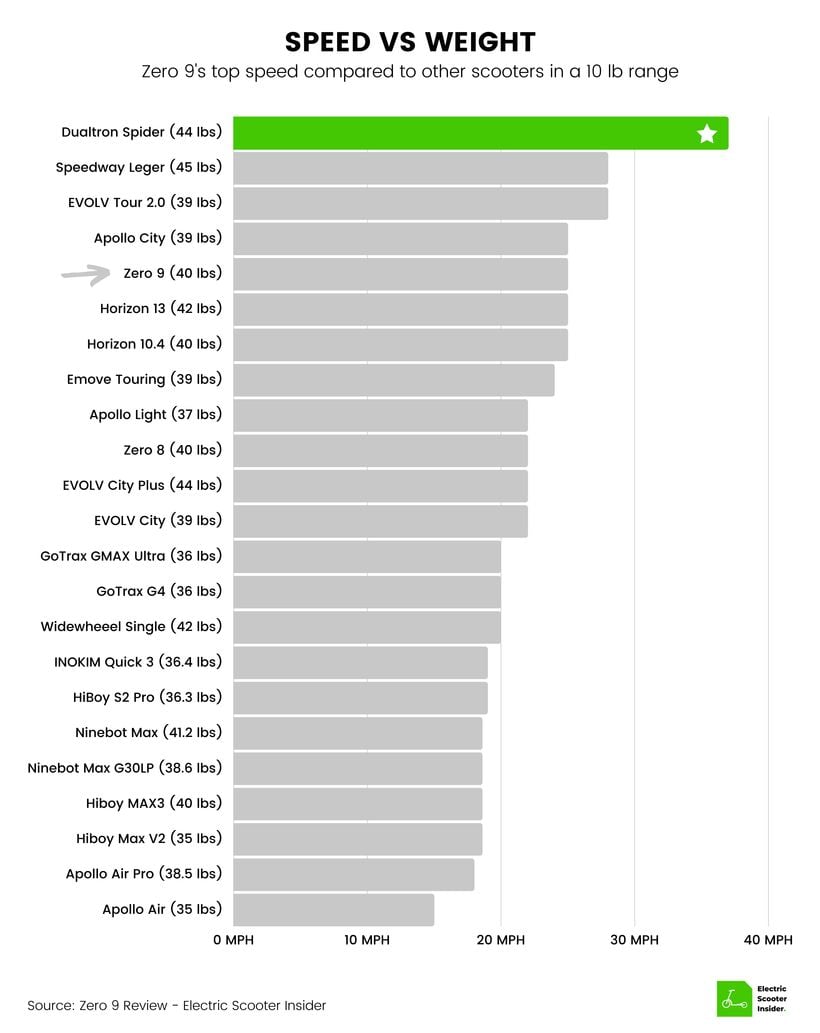
That said, there are better options on the market as far as that speed/weight balance is concerned – and it’s the nimble, lightning-quick Dualtron Spider living up to its name, ensconced in a web of speed at the summit of our rankings. With a top speed of 37 mph (that’s a whole 48% faster than the Zero 9), the Spider is a great choice for speed fiends. However, at $2,450, it’s well over double the price of the Zero 9 – so it definitely won’t be for everyone.
Ranking joint second are the Speedway Leger and EVOLV Tour 2.0. This brings us to the four scooters closing out our podium positions in third. Here, the Zero 9 shares the spoils with the Apollo City and pair of Horizon scooters, the 13 and 10.4 – so can they be separated?
Stepping back from the rankings and looking at all the scooters in the list beyond their stats alone, it’s the Apollo City that emerges as my top choice. Not only is it an extremely popular scooter, but – as I mentioned earlier – it’s almost identical to the Zero 9 in every way. Not to mention that the City flaunts a longer range, superior load-bearing capacity, cheaper price point, and an IP54 water-resistance rating – so I know which one I’d pick.
Acceleration
Sporting just a single motor alone, the Zero 9 was never going to have the most rapid acceleration rate. And the numbers bear that out – the 9 takes a full 4.2 seconds to reach 15 mph from a standstill. Here’s how that stacks up against some of the scooter’s fiercest rivals:
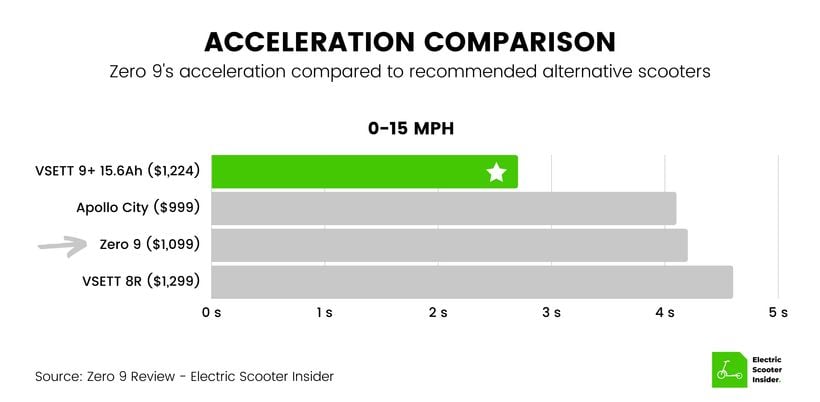
Just as our speed vs price comparison showed, our data here again shows that the VSETT 9+’s dual motors make it a better pick than the Zero 9. With a rapid acceleration rate of 2.7 seconds (that’s 36% faster than the 9), it leaves the likes of the Zero 9, the Apollo City, and the VSETT 9+’s little brother – the 8R – in the dust.
That’s not to say that the VSETT 9+ is without its drawbacks. Unlike the Zero 9, it lacks a telescopic stem, which makes it less portable. It also weighs considerably more (a whole 11 lbs more, to be exact), and with a lack of mood deck lighting, it isn’t quite as easy on the eye as the Zero 9 at night, either.
Just pipping the Zero 9 to that 15 mph mark is the Apollo City, which – despite being cut from the same cloth as the 9 – again proves that it’s the superior of the two separated-at-birth twins. If you’re looking for a commuter scooter that can collapse into a neat package – but that still packs plenty of punch when it comes to acceleration – the Apollo City is your best bet.
Range
The Zero 9 is capable of a maximum range of 25 miles off a single charge. The caveats here though are that you need to be in the lowest speed setting and weigh no more than 75 kg. You can switch up your riding mode from within the Zero 9’s intuitive QS-S4 display. The realistic mileage for the Zero 9, when ridden in full power mode, is around 18 miles.
Mileage vs Price Comparison
As always, let’s apply a $500 price range – with the Zero 9’s $1,099 asking price in the middle – to see how the scooter compares to similarly-priced models.
It’s a familiar story. Just as it did in the speed vs price comparison, the Zero 9 emerges in the mid to lower echelons of the table. Unfortunately, this shows that – as far as speed and mileage are concerned, at least – the 9 doesn’t offer a whole lot of bang for your buck.
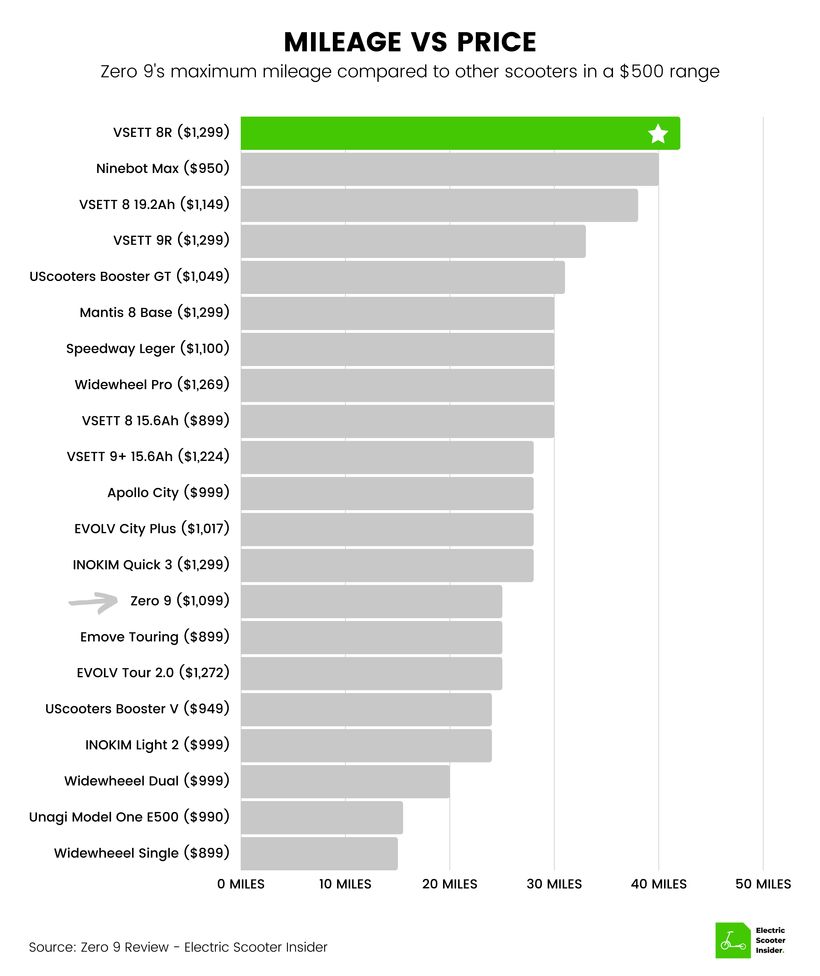
Another emerging narrative in these comparisons is a VSETT model topping the rankings. This time, however, it’s not the 9+ but its little brother – the 8R – that emerges at the top of the pile. And by a chunky margin – the VSETT 8R’s maximum range of 42 miles is close to double the 25 miles of the Zero 9.
With its comfy suspension and pneumatic tires, the VSETT 8R also offers the best ride quality of all the scooters in this bracket, which makes it hands down the best long-range option. But if you want to spend a little less (while still benefiting from a huge range), the VSETT 8 (19.2Ah) might be more up your alley.
Mileage vs Weight Comparison
Now, let’s put the Zero 9’s mileage through the microscope but this time, through the prism of weight. Collecting all the scooters in the Zero 9’s weight class (35 to 45 lbs) gives us a large complement of 22 models to compare it with – so how does it fare?
Not bad – but not amazingly, either. Dwelling firmly in the middle of the pack – joint with eight other models, including the popular Horizon 13 and the EMOVE Touring – it’s clear that the Zero 9 doesn’t offer anything special as far as mileage is concerned.
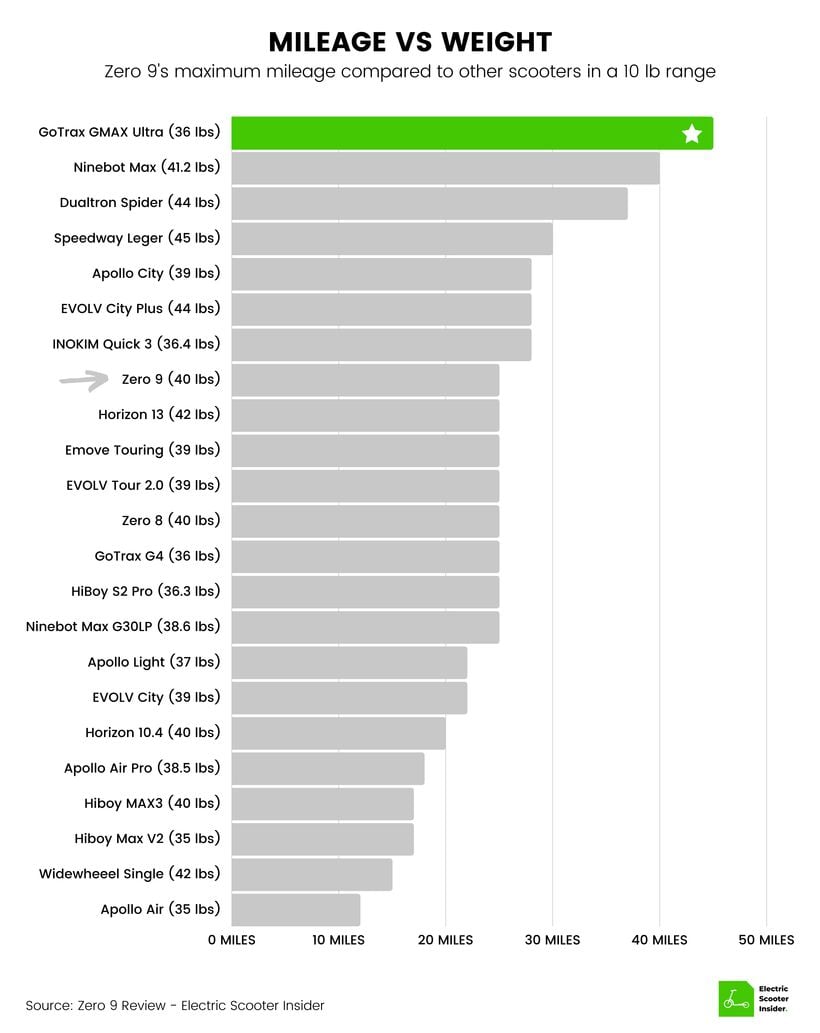
Rather, it’s the GoTrax GMAX Ultra – which boasts a whopping 45 miles of range – that takes the crown (on paper, at least). Impressively, it’s $299 cheaper and 4 lbs lighter than the Zero 9. However, the GMAX Ultra’s inferior 350W motor means it’s a much more sluggish accelerator and hill climber, and its top speed is a whole 4 mph slower than the Zero 9’s.
Moreover (and this also applies to the Ninebot Max, which finishes second in our rankings), the GoTrax GMAX Ultra isn’t primed for long-range rides. So, though it may be capable of hitting uber-long distances, the lack of suspension delivers a subpar riding experience.
With all that in mind, it’s the Dualtron Spider that presents itself as the best option. But as I mentioned earlier, it’s not exactly budget-friendly. If you can’t stretch to meet the Spider’s $2,450 asking price, you’re better off with the Apollo City.
Hill Climbing
As you might have expected, the Zero 9’s lack of dual motors means that it’s no great shakes when it comes to hill climbing.
The Zero 9 is capable of tackling hills of up to a 15 degree incline rate, though this will depend on the weight of the rider, as well as on which riding mode has been engaged.
For perspective, the VSETT 9+, which we discussed earlier as a fantastic alternative, is capable of handling gradients of up to 25 degrees.
Ultimately, the Zero 9’s hill-climbing capabilities are on par with the scooters of its ilk. It can climb hills twice as fast as entry-level scooters (like models from GoTrax and Hiboy), but it equally climbs hills 50% slower than high-performance models.
Electric Scooters For Climbing Hills: Breeze Up the Steepest of Inclines
Shock Absorption / Suspension
The Zero 9 sports front and rear springs that help insulate you from the vibrations of riding on well-maintained streets. The front, vertically-aligned, spring takes the brunt of impact while dual, horizontally-aligned, springs soak up the ricochet of vibrations from the front spring.
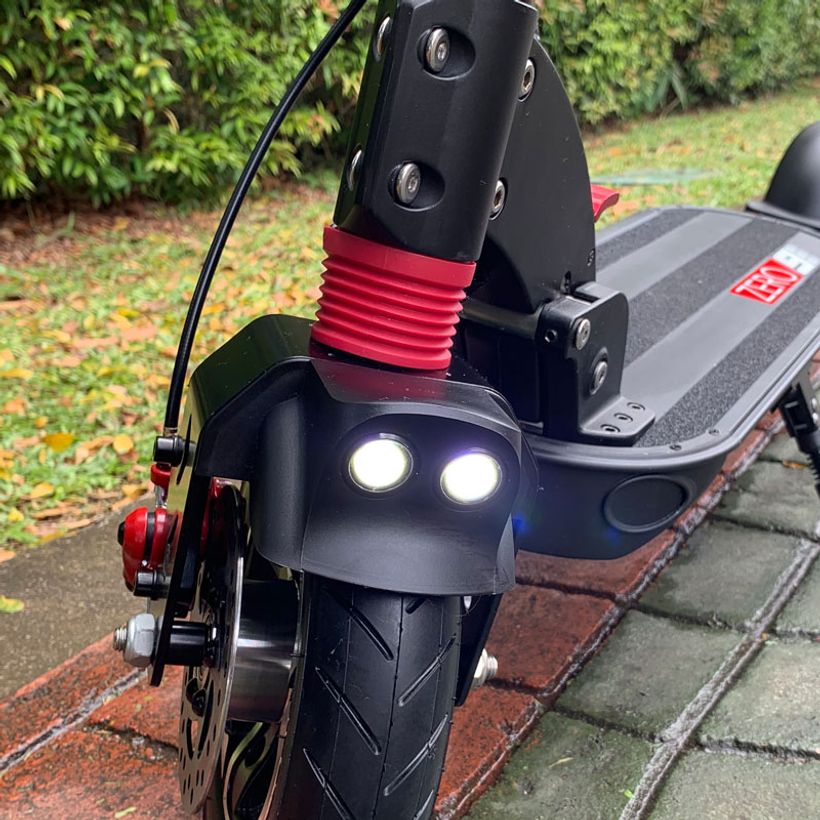
That said, the suspension doesn’t have much travel meaning it can feel stiff. It’s also not adjustable, so you can’t customize it to fit the nature of the ground you’re traversing. However, this shouldn’t be too much of a turn-off if you have your eyes set on the Zero 9 – particularly if you only plan to ride on the predictable surfaces of the city.
Fortunately, the Zero 9 backs up its hard-working suspension with a pair of pneumatic tires. Filled with air, rather than a solid rubber or foam, these offer a first layer of defense against the jarring impacts of harsher roads.
Braking
The Zero 9 is equipped with a front disc complemented by a rear drum. These cable-actuated brakes (which, thanks to a pair of brake levers on the scooter’s handlebars, are always within grabbing distance) enable the Zero 9 to come to a complete stop in 3.3 meters from 15 mph – which is very good.
It’s worth noting that a little over half (57%) of the scooters in the Zero 9’s pricing range have dual mechanical brakes – the Zero 9 being one of them. The 9 is also one of only three scooters to utilize two types of brakes. While the Zero 9 and Apollo City both sport disc and drum brakes, the only other scooter to take this ‘mix and match’ approach is the INOKIM Quick 3, which pairs a front v-brake with a rear disc brake.
While this ‘pick and mix’ strategy may not necessarily seem the most intuitive, there are plenty of benefits to it. Drum brakes, for instance, are lower maintenance than the disc variety – so having a mix and match setup can help limit the amount of time you spend attending to your braking system.
The Zero 9 also comes with a regenerative braking system to back up its responsive drum-and-disc combo. This helps feed otherwise wasted kinetic energy from braking into the battery, prolonging your maximum range. If you don’t like how it feels, you can either turn it off or customize its strength via the scooter’s QS-S4 display.
Ultimately, though, there’s not enough of a distance between the braking performance of the Zero 9 and the scooters I recommend as alternatives to make this facet of the review a deal-breaker.
Charge Time
The Zero 9 takes 6-8 hours to reach a full charge when you use the single charger that comes in the box. However, you can cut that time in half by purchasing the fast charger.
Extra Features
QS-S4 Throttle Display for Customized Performance Configuration
First things first, let’s unpack the Zero 9’s thinking cap – that is, its QS-S4 display.
Playing the dual role of the finger throttle and display screen, the QS-S4 doesn’t just serve as the trigger you’ll use to control your speed and acceleration, it’s what you’ll use for real-time insights into your scooter’s health and current status.
From the QS-S4 screen – which is backlit so you can see it while riding at night and in direct sunlight – you can view your scooter’s speed, riding mode, and battery life. You can also view the mileage you’ve clocked up on your current trip, as well as the distance you’ve traveled in total.
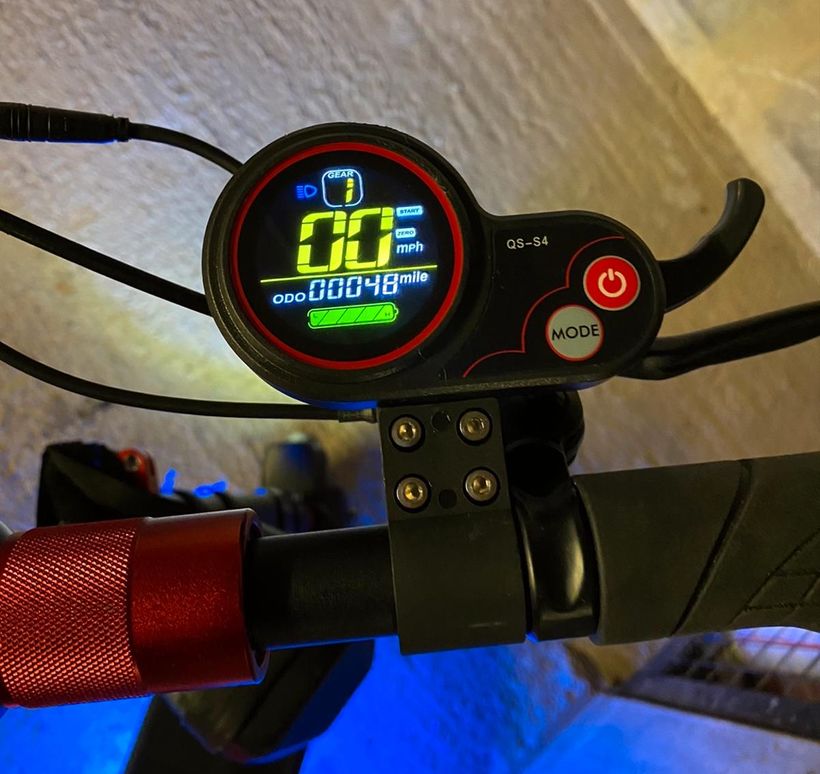
One of the things I love about a new scooter purchase is deep-diving into all the less obvious features it has to offer. And, if you do too, you’ll love tinkering with the QS-S4’s wide array of P-settings. They’ll take a bit of time to get used to – although this handy guide to your Zero QS-S4 display screen will certainly help.
Here’s where you’ll activate your cruise control feature, adjust the strength of its regenerative brakes and acceleration, and play with its arsenal of battery-saver settings, such as the brightness of its display and auto turn-off feature.
Oh, and if the QS-S4 display looks familiar, that’s because it is. Rather than being unique to the Zero line, the console is a standardized unit used on many other popular scooters. That includes Apollo, Kaabo, and VSETT.
The QS-S4 isn’t quite as customizable as the smart EY3 device that you’ll find on higher performance models, nor does it come close to the eye-watering capabilities that the NAMI Burn-e’s industry-leading console offers. However, the QS-S4 still does a great job and is the perfect match for the Zero 9’s capabilities.
Secret Feature: Hidden USB Port to Charge Your Mobile and Accessories
There’s more to the Zero 9 than meets the eye – particularly as far as its QS-S4 display is concerned.
Because look closer, and you’ll see a subtly tucked away USB port behind the screen’s circular frame. If you’re desperate, you can use this plug in your electronic devices to charge on the go – however, I wouldn’t recommend it. Harvesting your Zero 9’s QS-S4 display for smartphone power won’t only drain your scooter’s battery, but also risks sizzling the very circuits that help keep this device ticking – so charge at your peril.
Cruise Control
Accessible via the multi-talented QS-S4 display is the scooter’s cruise control function. Enable this while you’re out on the road to travel at a steady speed, and ease the strain on your finger by not having to keep the throttle constantly pulled down.
To engage cruise control, head to setting P6 before you set out, and change the ‘0’ on the dial to ‘1’. Once you’ve set off – and have reached the speed you want to stay at – the cruise control feature will do its work, and allow you to release control.
To stop cruise control, simply squeeze the brakes, and you’ll regain manual control over your scooter.
LED Lights (Featuring a Stem Strip and Mood Deck LEDs)
The Zero 9 may not stand out from the crowd so much when it comes to its build or basic specs, but wow – does it look good. This thing’s dolled up in so much swag lighting, it looks straight out of the neon-filled downtown strip from an 80s film – or the movie Tron.
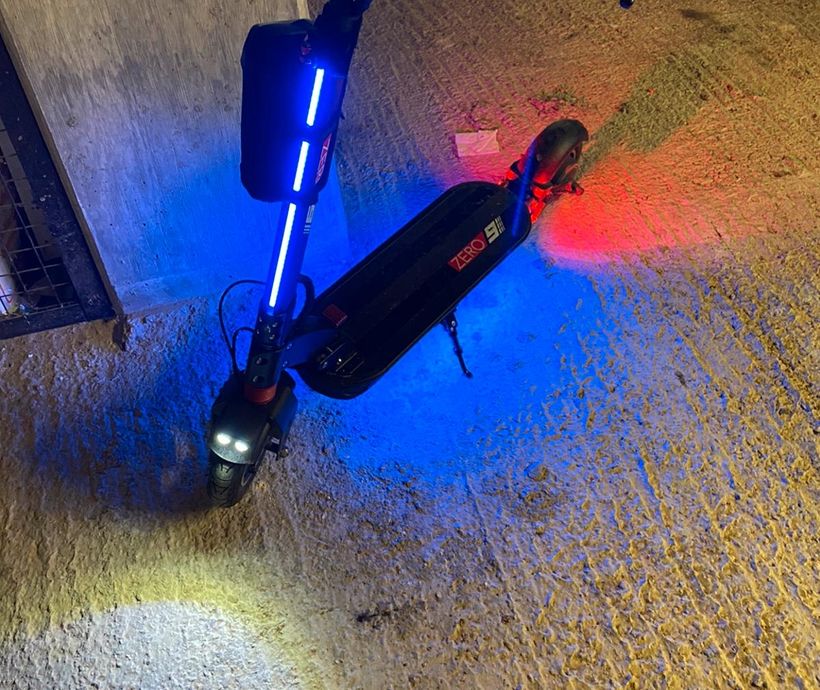
Decked out with thin strips of LEDs running the length of its stem and deck, the Zero 9 offers one of the most eye-catching lighting displays you'll see on a scooter of its class. It also sports a responsive tail light, which is embedded into the rear of its deck. It’s exciting stuff, particularly for those with an aesthetic leaning.
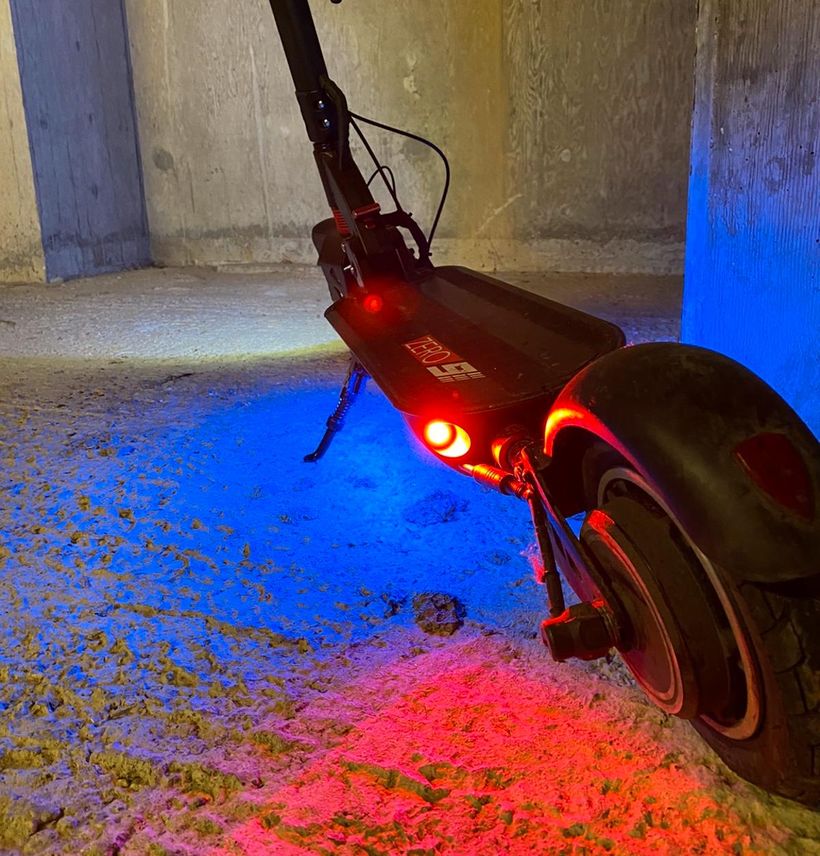
The only disappointment here comes from the headlight. Located low down at the front of the scooter – on the fender – it fails to provide adequate illumination for riding at night. I always prefer to see headlights situated higher up on a scooter’s stem (closer to the handlebars) for this very reason.
Against that backdrop, you’ll need to strap on some extra rechargeable lights to ride the Zero 9 safely after dark.
Telescopic Stem for Adjustable Handlebar Height
As a general rule, the more an electric scooter costs, the more features it will come with.
But one notable exception to that rule is the telescopic stem – a great value add that you’re far less likely to see on more premium scooters, but that you will see on the likes of the Zero 9 and other commuter models. This feature allows you to adjust the scooter’s stem across a 10-inch range (29” to 39”), meaning you can customize it to fit the height that you find most comfortable.
The telescopic stem also offers extra benefits as far as portability is concerned, by enabling you to further reduce the size of the scooter when packing it down into storage or transit.
This feature isn’t without its drawbacks, though. These moving parts can contribute to a lack of stem stability, which means you do run the gauntlet of stem wobble when you’re on the road.
Ultimately, this isn’t something you should worry too much about, nor should it deter you from opting for the Zero 9 (or, better still, the Apollo City). Just make sure to securely fasten the quick-release lever that holds the stem into place to make each ride a safe and enjoyable one.
Foldable Handlebars for Enhanced Portability
The handlebars collapse via a folding screw mechanism. This allows the scooter to benefit from even more portability and looks great to boot.
Perhaps the only thing to watch out for is that the locking rings tend to loosen up after several sojourns. This isn’t a big deal, though, and you can stay on top of this issue by remaining vigilant and checking how secure they are before and after each ride.
Optional Seat Attachment
If there’s one thing better than riding a scooter, it’s riding a scooter sitting down.
And, fortunately, the Zero 9 offers an optional seat attachment that’s available to purchase for just $95.
Adjustable and with hydraulic suspension in the post, the seat is built for maximum comfort and can be customized to fit your height and preferred riding position.
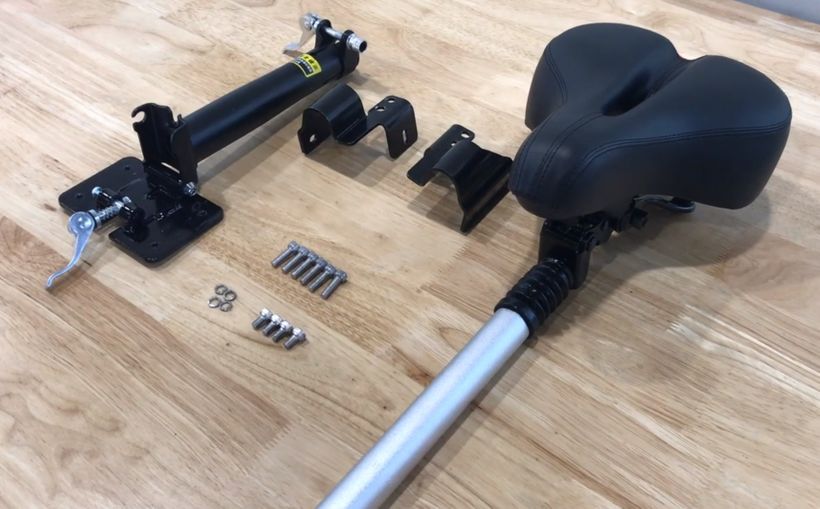
Scooters of the Zero 9’s price that can be fitted with seat attachments are all too rare. There’s only a handful that qualify, including the Apollo City, WideWheel Pro, EMOVE Touring, and a couple of others – so an affordable extra seat is an added gem.
What’s more, you won’t require the services of a professional (or need much DIY acumen on your part) to install it. While it comes with some screws, there’s no drilling or overly technical stuff to get it attached.
Specification: Zero 9 Review
| Brand | ||||||||||||
|---|---|---|---|---|---|---|---|---|---|---|---|---|
|
||||||||||||
| Type | ||||||||||||
|
||||||||||||
| Design | ||||||||||||
|
||||||||||||
| Performance | ||||||||||||
|
||||||||||||
| Extra Features | ||||||||||||
|
||||||||||||
Warranty & Post-Purchase Support
Warranty
Buying your Zero 9 through REV Rides, the Zero line’s foremost distributor in the U.S. treats you to a 12-month warranty.
Overall, this is pretty standard – although, it does fall short of the Apollo City’s warranty which matches the 12 months of cover for manufacturer defects but also delivers a further 12 months of cover for repairs where you are only invoiced for what costs Apollo to repair your scooter (i.e. they don’t slap a service fee on top of the repairs).
You can, however, opt to extend the Zero 9’s warranty via third-party product protection company Extend. One extra year costs $209, two additional years is $319, and a three-year extension is $419.
So, what about the small print? Well, much like its competitors, the Zero 9’s warranty doesn’t cover wear and tear, nor does it cover any damage that arises as a result of your abuse or neglect of the scooter.
Predictably, issues that come about as a result of accidents or collisions aren’t covered, either – nor is environmental damage, such as that caused by wind, fire, rain, or taking your Zero 9 anywhere you shouldn’t. Faults that result from any unauthorized modifications to the scooter you may have made will likewise void the warranty.
Somewhat annoyingly, REV Rides’ warranty also excludes labor – so, even if the damage itself should legitimately be covered under the policy, you may still wind up being slapped with a check for the repair guy’s troubles.
Post-Purchase Support
The REV Rides customer care team is available between 8 am and 4 pm PST, Monday to Friday – simply dial 1-360-888-7433 to get in touch. You can also take advantage of the company’s stellar email-based support by pinging a query to contactus@revrides.com or utilize the online form on their website to submit a support request.
REV Rides’ superlative commitment to customer service and attention to detail is something I’ve been lucky enough to witness firsthand when I jumped on a call with the company’s CEO, Nathan Pust, earlier this year. We talked all things Zero and VSETT, and I got a real sense of the team’s passion, and the emphasis they place on quality control.
Head to REV Rides’ YouTube channel, and you’ll see exactly what I mean. It’s brimming with content about the Zero 9, from guides about its QS-S4 display and P-settings, to tutorials showing you how to change the tires and tubes. You’ll also find walkthroughs around folding the 9’s handlebars, adjusting its brakes, and how to align the steering.
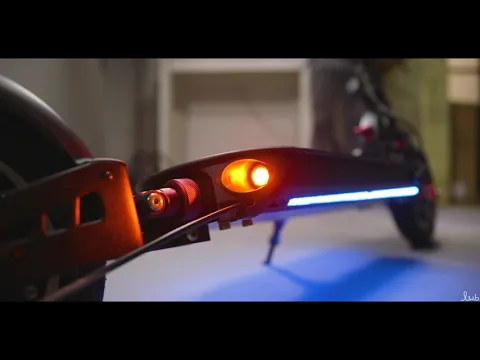
Take a Close Look at the Zero 9's Frame & Features
From its eye-catching blue LED strip lights to its foldable handlebars and telescopic stem, feast your eyes on the Zero 9's sleek red, white, and black frame.
Specification: Zero 9 Review
| Brand | ||||||||||||
|---|---|---|---|---|---|---|---|---|---|---|---|---|
|
||||||||||||
| Type | ||||||||||||
|
||||||||||||
| Design | ||||||||||||
|
||||||||||||
| Performance | ||||||||||||
|
||||||||||||
| Extra Features | ||||||||||||
|
||||||||||||


